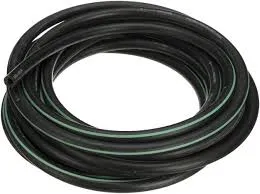outdoor natural gas hose
Nov . 12, 2024 16:49 Back to list
outdoor natural gas hose
The Importance of Outdoor Natural Gas Hoses A Comprehensive Guide
Outdoor natural gas hoses play an integral role in the efficiency, safety, and functionality of various outdoor appliances that rely on natural gas. These hoses facilitate the transport of gas from the supply source to the appliance, such as grills, heaters, and fire pits. Understanding the significance of using the right outdoor natural gas hose is crucial for anyone looking to enjoy these amenities while ensuring safety and compliance with regulations.
What is an Outdoor Natural Gas Hose?
An outdoor natural gas hose is a flexible tube specifically designed to carry natural gas from a storage tank or pipeline to an outdoor appliance. Made from durable materials, these hoses can withstand the elements, including UV exposure, rain, and temperature fluctuations. Their construction is essential for maintaining a safe and leak-free operation.
Selecting the Right Hose
When choosing an outdoor natural gas hose, several factors need to be considered
1. Material Natural gas hoses are often made from materials like rubber or stainless steel, each offering different levels of durability, flexibility, and resistance to environmental conditions. Rubber hoses tend to be more flexible, making them easier to manipulate in tight spaces, while stainless steel hoses offer greater strength and resistance to cuts and abrasions.
2. Length and Diameter The hose length will depend on the distance from the gas source to the appliance. Additionally, the diameter should match the appliance’s requirements to ensure efficient gas flow. A hose that is too long or too narrow may lead to pressure drops, affecting the performance of the appliance.
3. Pressure Rating Natural gas hoses come with different pressure ratings. It is vital to select a hose that can handle the maximum pressure of the gas supply to avoid any safety hazards.
4. Compliance Always choose hoses that comply with local regulations and safety standards, such as those set by the National Fire Protection Association (NFPA) or other relevant authorities. This ensures that your setup is not only effective but also safe for use.
outdoor natural gas hose

Installation and Maintenance
Proper installation is critical for ensuring the safe operation of outdoor natural gas appliances. Always follow the manufacturer’s instructions and consider hiring a certified technician for the installation. Key installation tips include
- Ensure all connections are tight to prevent leaks. - Use appropriate fittings that match the hose size and material to avoid any incompatibility issues. - Regularly check for any signs of wear and tear. Look out for cracks, bulges, or other visible damage.
In terms of maintenance, it is recommended to inspect the hose periodically. Keeping the hose clean and free from debris can prevent blockages and enhance its lifespan. If you notice any issues, replace the hose promptly to maintain safety and functionality.
Safety Considerations
Safety should always be a top priority when working with natural gas. Here are some safety tips to keep in mind
- Leak Testing Periodically perform a leak test using soapy water. Apply the mixture to the connections and watch for bubbles, which indicate a leak. - Ventilation Ensure that the area where the gas appliance is used is well-ventilated to prevent gas accumulation. - Storage Store hoses away from direct sunlight and extreme temperatures when not in use to prolong their life. - Emergency Measures Familiarize yourself with the location of the gas shut-off valve and how to operate it in case of an emergency.
Conclusion
Outdoor natural gas hoses are essential components for safely operating outdoor appliances. From selecting the right material and size to ensuring proper installation and maintenance, attention to detail is key. By prioritizing safety and compliance, you can enjoy the convenience of natural gas-powered appliances while minimizing risks. Whether you are hosting a backyard barbecue or relaxing by a fire pit, understanding the importance of your gas hose will ensure a safe and enjoyable experience. Always prioritize quality and safety to get the best from your outdoor natural gas setup.
